【英语】 中考英语一般过去时专项训练100(附答案)
- 格式:doc
- 大小:79.00 KB
- 文档页数:8
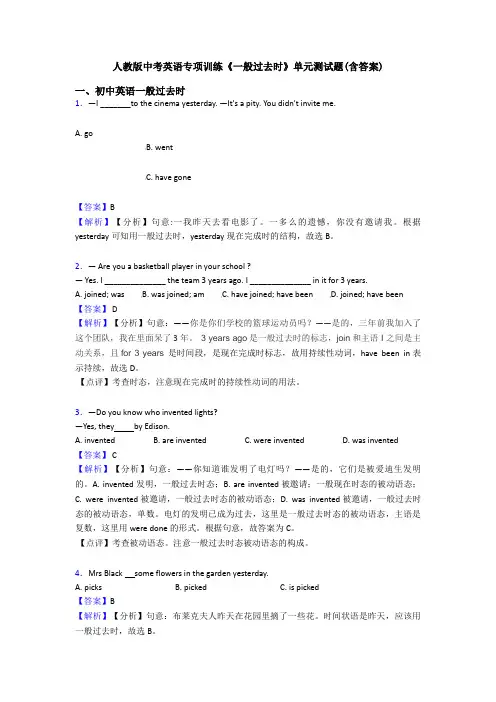
人教版中考英语专项训练《一般过去时》单元测试题(含答案)一、初中英语一般过去时1.—I _______to the cinema yesterday. —It's a pity. You didn't invite me.A. goB. wentC. have gone【答案】B【解析】【分析】句意:一我昨天去看电影了。
一多么的遗憾,你没有邀请我。
根据yesterday可知用一般过去时,yesterday现在完成时的结构,故选B。
2.— Are you a basketball player in your school ?— Yes. I ______________ the team 3 years ago. I ______________ in it for 3 years.A. joined; wasB. was joined; amC. have joined; have beenD. joined; have been 【答案】 D【解析】【分析】句意:——你是你们学校的篮球运动员吗?——是的,三年前我加入了这个团队,我在里面呆了3年。
3 years ago是一般过去时的标志,join和主语 I 之间是主动关系,且for 3 years是时间段,是现在完成时标志,故用持续性动词,have been in表示持续,故选D。
【点评】考查时态,注意现在完成时的持续性动词的用法。
3.—Do you know who invented lights?—Yes, they by Edison.A. inventedB. are inventedC. were inventedD. was invented【答案】 C【解析】【分析】句意:——你知道谁发明了电灯吗?——是的,它们是被爱迪生发明的。
A. invented发明,一般过去时态;B. are invented被邀请;一般现在时态的被动语态;C. were invented被邀请,一般过去时态的被动语态;D. was invented被邀请,一般过去时态的被动语态,单数。

【英语】中考英语过去将来时一般过去时100篇及答案一、过去将来时1.He after supper a couple of years ago.A. smokedB. would smokeC. smokesD. will smoke【答案】B【解析】【分析】句意:几年前他吃完饭就吸烟。
a couple of years ago是过去时的时间状语,吸烟是吃完饭之后发生的事情,would+过去原形,表示过去习惯性的动作。
故选B。
【点评】考查would+动词原形表习惯性动作。
2.—What did Alice say?—She said she me at eight o'clock tomorrow morning.A. is callingB. was callingC. will callD. would call【答案】 D【解析】【分析】句意:爱丽丝说了什么?——她说她明天上午八点钟给我打电话。
结合语境可知下文从句中描述的是站在过去角度看将来发生的动作,故用过去将来时态。
选D。
【点评】英语中的时态主要是借助于时间状语与上下文语境来进行判断。
解答此类题型,首先要注意句子中的时间状语,如果没有则要通过分析上下文,结合语境来判断句子的时态。
英语疑问句中一般具有时态上的对应关系,注意结合这一特点进行区分。
3.—What did the teacher say to you just now?—She asked _______.A. where did I buy the dictionaryB. where I bought the dictionaryC. where do I buy the dictionaryD. where I buy dictionary【答案】 B【解析】【分析】考查宾语从句。
一方面,宾语从句要用陈述语序;另一方面,主句是一般过去时,宾语从句也要用过去的某种时态,故选B。

英语】中考英语一般过去时练习题及答案一、初中英语一般过去时1. They don't live here any longer. They _____ to Chengdu last month.A. move B . moved C. will move 【答案】 B 【解析】 【分析】句意:他们不再住在这里了。
他们上个月搬到成都了。
般过去时的时间状语,动词用过去式,故答案选B 。
点评】考查一般过去时态。
2. In February, Chinese tech company Huawei ______ Mate X, a foldable (可折叠的) 5G mobile phone.A. is introducingB. introducedC. introducesD. was introduced【答案】 B【解析】 【分析】句意:二月,中国科技公司华为介绍 Mate X ,一款可折叠 5G 手机。
根 据 In February ,可知陈述过去的事情,用一般过去时,谓语动词用过去式, introduce 介 绍,其过去式是 introduced ,故选 B 。
【点评】考查动词的时态,注意句子涉及一般过去时。
3.— Where did you go last weekend?— Ito the Great Wall. A. go B. wentC. will goD. have gone 【答案】 B【解析】 【分析】句意: ——上个周末你去哪里了? ——我去长城了。
A,go 一般现在时。
B,went 一般过去时 C,will go 一般将来时。
D,have gone 现在完成时。
据时间状语 last weekend 可知此处用一般过去时,故用动词的过去式 went 。
故选 B 。
【点评】本题考查一般过去时。
以及 go 、 went 、 will go 、 have gone 四种事态的用法和区 别。
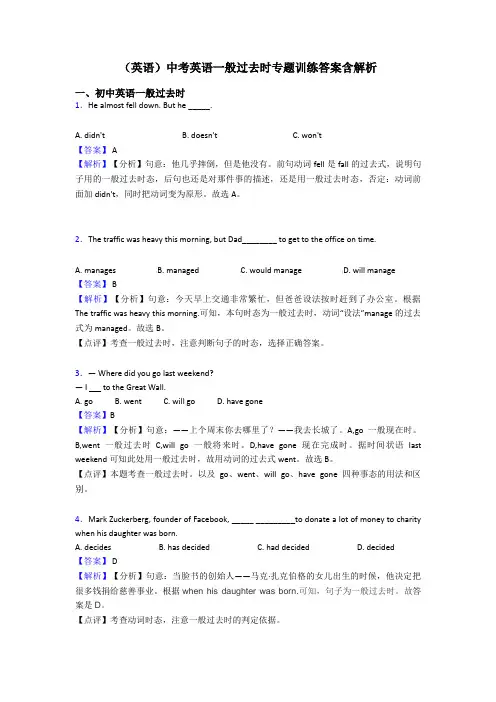
(英语)中考英语一般过去时专题训练答案含解析一、初中英语一般过去时1.He almost fell down. But he _____.A. didn'tB. doesn'tC. won't【答案】 A【解析】【分析】句意:他几乎摔倒,但是他没有。
前句动词fell是fall的过去式,说明句子用的一般过去时态,后句也还是对那件事的描述,还是用一般过去时态,否定:动词前面加didn't,同时把动词变为原形。
故选A。
2.The traffic was heavy this morning, but Dad________ to get to the office on time.A. managesB. managedC. would manageD. will manage【答案】 B【解析】【分析】句意:今天早上交通非常繁忙,但爸爸设法按时赶到了办公室。
根据The traffic was heavy this morning.可知,本句时态为一般过去时,动词“设法”manage的过去式为managed。
故选B。
【点评】考查一般过去时,注意判断句子的时态,选择正确答案。
3.— Where did you go last weekend?— I to the Great Wall.A. goB. wentC. will goD. have gone【答案】B【解析】【分析】句意:——上个周末你去哪里了?——我去长城了。
A,go一般现在时。
B,went一般过去时C,will go一般将来时。
D,have gone现在完成时。
据时间状语last weekend可知此处用一般过去时,故用动词的过去式went。
故选B。
【点评】本题考查一般过去时。
以及go、went、will go、have gone四种事态的用法和区别。
4.Mark Zuckerberg, founder of Facebook, _____ _________to donate a lot of money to charity when his daughter was born.A. decidesB. has decidedC. had decidedD. decided【答案】 D【解析】【分析】句意:当脸书的创始人——马克·扎克伯格的女儿出生的时候,他决定把很多钱捐给慈善事业。
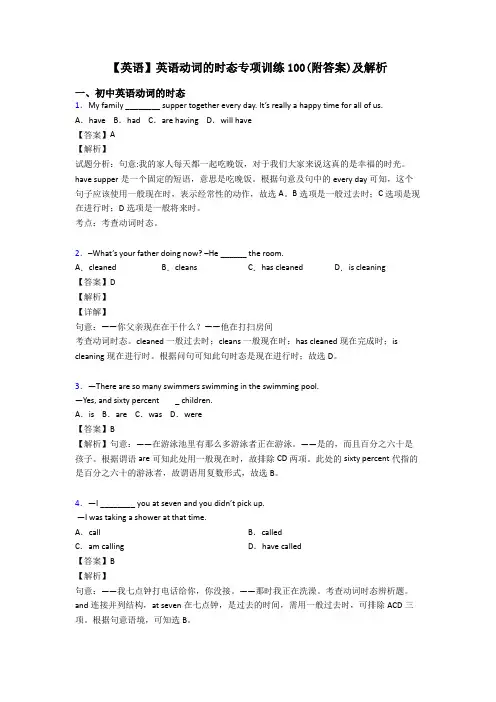
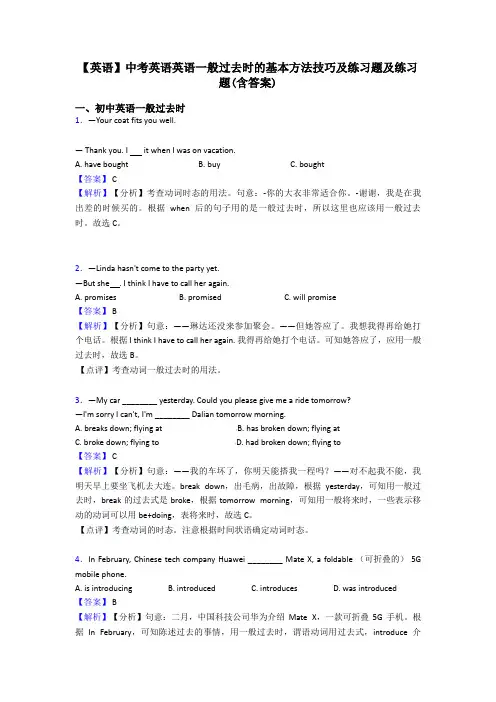
【英语】中考英语英语一般过去时的基本方法技巧及练习题及练习题(含答案)一、初中英语一般过去时1.—Your coat fits you well.— Thank you. I it when I was on vacation.A. have boughtB. buyC. bought【答案】 C【解析】【分析】考查动词时态的用法。
句意:-你的大衣非常适合你。
-谢谢,我是在我出差的时候买的。
根据when后的句子用的是一般过去时,所以这里也应该用一般过去时。
故选C。
2.—Linda hasn't come to the party yet.—But she . I think I have to call her again.A. promisesB. promisedC. will promise【答案】 B【解析】【分析】句意:——琳达还没来参加聚会。
——但她答应了。
我想我得再给她打个电话。
根据 I think I have to call her again. 我得再给她打个电话。
可知她答应了,应用一般过去时,故选B。
【点评】考查动词一般过去时的用法。
3.—My car ________ yesterday. Could you please give me a ride tomorrow?—I'm sorry I can't, I'm ________ Dalian tomorrow morning.A. breaks down; flying atB. has broken down; flying atC. broke down; flying toD. had broken down; flying to【答案】 C【解析】【分析】句意:——我的车坏了,你明天能搭我一程吗?——对不起我不能,我明天早上要坐飞机去大连。
break down,出毛病,出故障,根据yesterday,可知用一般过去时,break的过去式是broke,根据tomorrow morning,可知用一般将来时,一些表示移动的动词可以用be+doing,表将来时,故选C。

(英语)中考英语一般过去时专项训练及答案一、初中英语一般过去时1.He almost fell down. But he _____.A. didn'tB. doesn'tC. won't【答案】 A【解析】【分析】句意:他几乎摔倒,但是他没有。
前句动词fell是fall的过去式,说明句子用的一般过去时态,后句也还是对那件事的描述,还是用一般过去时态,否定:动词前面加didn't,同时把动词变为原形。
故选A。
2.— Are you a basketball player in your school ?— Yes. I ______________ the team 3 years ago. I ______________ in it for 3 years.A. joined; wasB. was joined; amC. have joined; have beenD. joined; have been【答案】 D【解析】【分析】句意:——你是你们学校的篮球运动员吗?——是的,三年前我加入了这个团队,我在里面呆了3年。
3 years ago是一般过去时的标志,join和主语 I 之间是主动关系,且for 3 years是时间段,是现在完成时标志,故用持续性动词,have been in表示持续,故选D。
【点评】考查时态,注意现在完成时的持续性动词的用法。
3.I was walking in the street when someone _______ me.A. calledB. was callingC. callsD. call【答案】 A【解析】【分析】句意:我正在街上走这时有人叫我。
状语从句中前后时态要保持一致,根据主句中的was walking可知此处用过去的时态,排除CD;此处call表示短暂性动作,所以不用进行时态,故答案为A。
【点评】考查动词的时态,注意时态的前后一致。
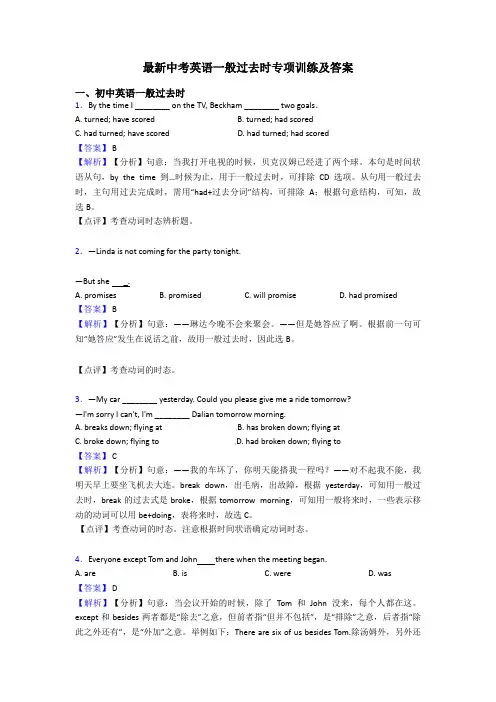
最新中考英语一般过去时专项训练及答案一、初中英语一般过去时1.By the time I ________ on the TV, Beckham ________ two goals.A. turned; have scoredB. turned; had scoredC. had turned; have scoredD. had turned; had scored【答案】 B【解析】【分析】句意:当我打开电视的时候,贝克汉姆已经进了两个球。
本句是时间状语从句,by the time到…时候为止,用于一般过去时,可排除CD选项。
从句用一般过去时,主句用过去完成时,需用“had+过去分词”结构,可排除A;根据句意结构,可知,故选B。
【点评】考查动词时态辨析题。
2.—Linda is not coming for the party tonight.—But she _.A. promisesB. promisedC. will promiseD. had promised【答案】 B【解析】【分析】句意:——琳达今晚不会来聚会。
——但是她答应了啊。
根据前一句可知“她答应”发生在说话之前,故用一般过去时,因此选B。
【点评】考查动词的时态。
3.—My car ________ yesterday. Could you please give me a ride tomorrow?—I'm sorry I can't, I'm ________ Dalian tomorrow morning.A. breaks down; flying atB. has broken down; flying atC. broke down; flying toD. had broken down; flying to【答案】 C【解析】【分析】句意:——我的车坏了,你明天能搭我一程吗?——对不起我不能,我明天早上要坐飞机去大连。
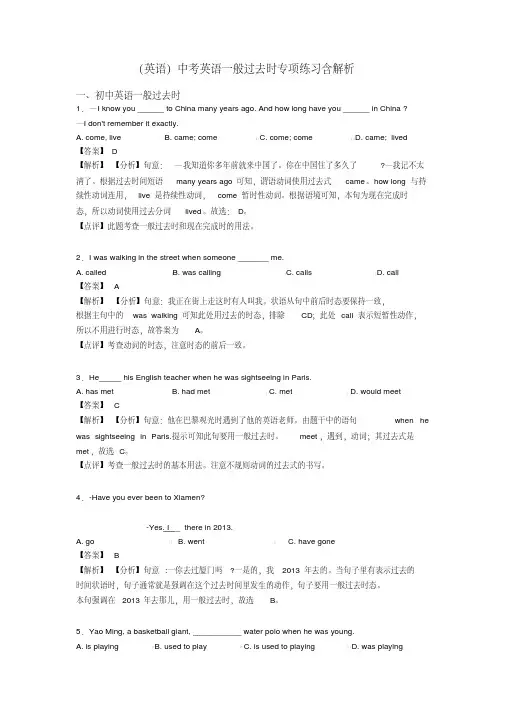
(英语)中考英语一般过去时专项练习含解析一、初中英语一般过去时1.—I know you ______ to China many years ago. And how long have you ______ in China ?—I don't remember it exactly.A. come, liveB. came; comeC. come; comeD. came; lived【答案】D【解析】【分析】句意:—我知道你多年前就来中国了。
你在中国住了多久了?—我记不太清了。
根据过去时间短语many years ago可知,谓语动词使用过去式came。
how long与持续性动词连用,live是持续性动词,come暂时性动词。
根据语境可知,本句为现在完成时态,所以动词使用过去分词lived。
故选:D。
【点评】此题考查一般过去时和现在完成时的用法。
2.I was walking in the street when someone _______ me.A. calledB. was callingC. callsD. call【答案】 A【解析】【分析】句意:我正在街上走这时有人叫我。
状语从句中前后时态要保持一致,根据主句中的was walking可知此处用过去的时态,排除CD;此处call表示短暂性动作,所以不用进行时态,故答案为A。
【点评】考查动词的时态,注意时态的前后一致。
3.He_____ his English teacher when he was sightseeing in Paris.A. has metB. had metC. metD. would meet【答案】 C【解析】【分析】句意:他在巴黎观光时遇到了他的英语老师。
由题干中的语句when he was sightseeing in Paris.提示可知此句要用一般过去时。
meet,遇到,动词;其过去式是met,故选C。
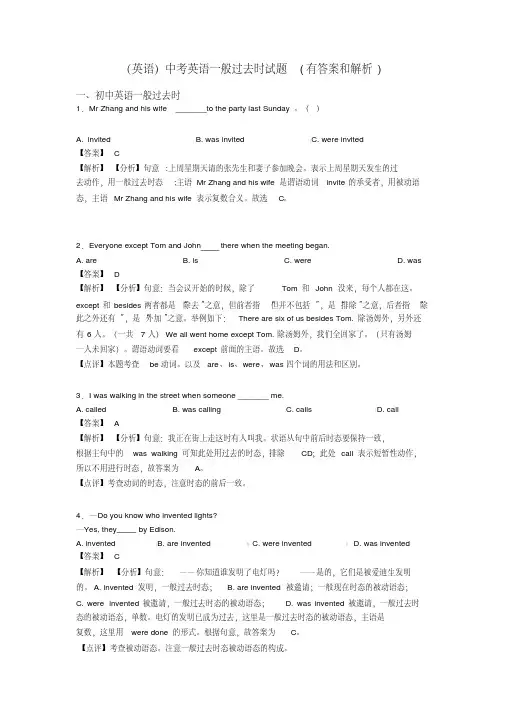
(英语)中考英语一般过去时试题(有答案和解析)一、初中英语一般过去时1.Mr Zhang and his wife _______to the party last Sunday。
()A. invitedB. was invitedC. were invited【答案】 C【解析】【分析】句意:上周星期天请的张先生和妻子参加晚会。
表示上周星期天发生的过去动作,用一般过去时态;主语Mr Zhang and his wife是谓语动词invite的承受者,用被动语态,主语Mr Zhang and his wife表示复数合义。
故选C。
2.Everyone except Tom and John there when the meeting began.A. areB. isC. wereD. was 【答案】 D【解析】【分析】句意:当会议开始的时候,除了Tom和John没来,每个人都在这。
except和besides两者都是“除去”之意,但前者指“但并不包括”,是“排除”之意,后者指“除此之外还有”,是“外加”之意。
举例如下:There are six of us besides Tom.除汤姆外,另外还有6人。
(一共7人)We all went home except Tom.除汤姆外,我们全回家了。
(只有汤姆一人未回家)。
谓语动词要看except前面的主语。
故选D。
【点评】本题考查be动词。
以及are、is、were、was四个词的用法和区别。
3.I was walking in the street when someone _______ me.A. calledB. was callingC. callsD. call【答案】 A【解析】【分析】句意:我正在街上走这时有人叫我。
状语从句中前后时态要保持一致,根据主句中的was walking可知此处用过去的时态,排除CD;此处call表示短暂性动作,所以不用进行时态,故答案为A。
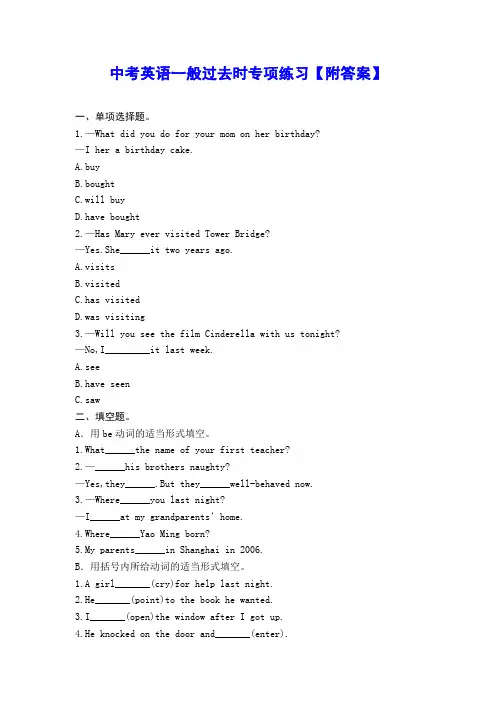
中考英语一般过去时专项练习【附答案】一、单项选择题。
1.—What did you do for your mom on her birthday?—I her a birthday cake.A.buyB.boughtC.will buyD.have bought2.—Has Mary ever visited Tower Bridge?—Yes.She______it two years ago.A.visitsB.visitedC.has visitedD.was visiting3.—Will you see the film Cinderella with us tonight?—No,I_________it last week.A.seeB.have seenC.saw二、填空题。
A.用be动词的适当形式填空。
1.What______the name of your first teacher?2.—______his brothers naughty?—Yes,they______.But they______well-behaved now.3.—Where______you last night?—I______at my grandparents’home.4.Where______Yao Ming born?5.My parents______in Shanghai in 2006.B.用括号内所给动词的适当形式填空。
1.A girl_______(cry)for help last night.2.He_______(point)to the book he wanted.3.I_______(open)the window after I got up.4.He knocked on the door and_______(enter).5.Tom jumped up and_______(rush)to the door.参考答案一、单项选择题。
【英语】中考英语一般过去时专项训练及答案含解析一、初中英语一般过去时1.- Did you go to Li Lei's birthday party? - No, I ___________.A. am not invitedB. don't invite himC. wasn't invitedD. haven't invited【答案】 C【解析】【分析】句意:——你去参加李雷的生日聚会了吗?——没有,我没有被邀请。
根据句意可知用一般过去时的被动结构,故选C。
【点评】考查动词的时态和语态。
2.I was walking in the street when someone _______ me.A. calledB. was callingC. callsD. call【答案】 A【解析】【分析】句意:我正在街上走这时有人叫我。
状语从句中前后时态要保持一致,根据主句中的was walking可知此处用过去的时态,排除CD;此处call表示短暂性动作,所以不用进行时态,故答案为A。
【点评】考查动词的时态,注意时态的前后一致。
3.—Do you know who invented lights?—Yes, they by Edison.A. inventedB. are inventedC. were inventedD. was invented【答案】 C【解析】【分析】句意:——你知道谁发明了电灯吗?——是的,它们是被爱迪生发明的。
A. invented发明,一般过去时态;B. are invented被邀请;一般现在时态的被动语态;C. were invented被邀请,一般过去时态的被动语态;D. was invented被邀请,一般过去时态的被动语态,单数。
电灯的发明已成为过去,这里是一般过去时态的被动语态,主语是复数,这里用were done的形式。
英语一般过去时专项练习(附答案)含答案百度文库一、初中英语一般过去时1.Yesterday while I was walking in the park, I saw a watch on the ground and . I gave it to a policeman.A. picked it upB. picked up itC. to pick it upD. to pick up it【答案】 A【解析】【分析】句意:昨天我在公园散步的时候我看到地上有一个手表,捡了起来,我把它交给了警察。
and是并列连词,连接两个并列谓语,根据前面的saw,可知用一般过去时;pick up是动副短语,人称代词作宾语时,代词放中间。
故选A。
【点评】本题考查动副短语的用法和一般过去时。
注意动副短语中代词的位置。
2.He almost fell down. But he _____.A. didn'tB. doesn'tC. won't【答案】 A【解析】【分析】句意:他几乎摔倒,但是他没有。
前句动词fell是fall的过去式,说明句子用的一般过去时态,后句也还是对那件事的描述,还是用一般过去时态,否定:动词前面加didn't,同时把动词变为原形。
故选A。
3.— The hen ___________ three eggs yesterday.— It's amazing.A. lieB. layC. lainD. laid【答案】D【解析】【分析】——昨天那个母鸡下了三个蛋。
——真令人惊奇。
下蛋:lay eggs, yesterday是昨天的意思,和一般过去时连用,lay的过去式是laid, lie: 躺,撒谎,lay:lie 的过去式,或放,下蛋,lain是lie的过去分词,故选D。
【点评】考查动词辨析。
熟记这几个词的区别和意义。
4.They don't live here any longer. They _______ to Chengdu last month.A. moveB. movedC. will moveD. are moving【答案】B【解析】【分析】句意:他们不再住在这里了。
【英语】中考英语一般过去时专项训练100(附答案)一、初中英语一般过去时1.I _______ along the road when I saw Peter. So we stopped and had a chat.A. walkedB. was walkingC. would walkD. had walked【答案】 B【解析】【分析】句意:“当我看见彼得时我正在沿着马路走。
连词when意为“当……的时候”引导时间状语从句,从句用一般过去时,主句用过去进行时,表示当某一表示过去的动作发生时,另一动作正在进行。
故选B。
【点评】考查动词时态用法。
2.—Have you ever been to South Tower Park?—Yes. I ___________there a few months ago.A. wentB. have beenC. have gone【答案】A【解析】【分析】句意:—你曾经去过南塔公园吗?—是的,几个月前我去那儿了。
have been to曾经去过某地;have gone to去某地了;根据a few months ago.可知用一般过去时,动词用过去式,故选A。
【点评】考查动词时态辨析。
根据时间状语确定合适的动词。
3.He_____ his English teacher when he was sightseeing in Paris.A. has metB. had metC. metD. would meet【答案】 C【解析】【分析】句意:他在巴黎观光时遇到了他的英语老师。
由题干中的语句when he was sightseeing in Paris.提示可知此句要用一般过去时。
meet,遇到,动词;其过去式是met,故选C。
【点评】考查一般过去时的基本用法。
注意不规则动词的过去式的书写。
4.-Have you ever been to Xiamen?-Yes. I _ there in 2013.A. goB. wentC. have gone【答案】 B【解析】【分析】句意:一你去过厦门吗?一是的,我2013年去的。
当句子里有表示过去的时间状语时,句子通常就是强调在这个过去时间里发生的动作,句子要用一般过去时态。
本句强调在2013年去那儿,用一般过去时,故选B。
5.—Great changes have taken place in our hometown over the past years.—Yeah. Things ______different when we were young.A. have beenB. areC. will beD. were【答案】D【解析】【分析】句意:——在过去的几年里,我们家乡发生了巨大的变化。
——是的。
我们年轻时情况不同。
根据后文when we were young可知,本句时态为一般过去时,用were。
故选D。
【点评】考查一般过去时,注意根据时间状语或其他动词的时态,判断考查的时态。
6.John ________ his grandma every day when she was in hospital.A. visitedB. was visitingC. visitsD. is visiting【答案】 A【解析】【点评】句意:奶奶住院时,约翰每天去看她。
奶奶住院是过去的状态,在这期间发生的约翰每天看望奶奶的动作指的是过去经常反复发生的动作,用一般过去时态,动词用过去式。
故选A。
7.Yesterday while I was walking in the park, I saw a watch on the ground and . I gave it to a policeman.A. picked it upB. picked up itC. to pick it upD. to pick up it【答案】 A【解析】【分析】句意:昨天我在公园散步的时候我看到地上有一个手表,捡了起来,我把它交给了警察。
and是并列连词,连接两个并列谓语,根据前面的saw,可知用一般过去时;pick up是动副短语,人称代词作宾语时,代词放中间。
故选A。
【点评】本题考查动副短语的用法和一般过去时。
注意动副短语中代词的位置。
8.— Do you know yesterday?—Yes. She was ill in hospital.A. why didn't Jenny go to schoolB. why doesn't Jenny go to schoolC. why Jenny didn't go to schoolD. why Jenny doesn't go to school【答案】C【解析】【分析】句意:——你知道詹妮昨天为什么没去上学吗?——是的,她生病住院了。
根据yesterday,昨天,可知用一般过去时,宾语从句的语序要用陈述语序,故选C。
【点评】考查宾语从句。
9.—The bread is really delicious.—Thank you, I ________ it myself.A. makeB. madeC. will makeD. am making【答案】B【解析】【分析】句意:—面包真的很好吃。
—谢谢,我自己做的。
根据句意“面包美味可口”得知面包已做好,则说自己做的应为过去的动作,因此应使用一般过去时态。
故答案选B。
【点评】考查动词时态的辨析。
注意根据语境判断出动作是什么时候发生的从而确定时态。
10.—Have you seen my brother?—Yes. I _____ him in the library five minutes ago.A. metB. have metC. meetD. have been met【答案】 A【解析】【分析】句意:---你看到我哥哥了吗?---是的,我五分钟前在图书馆遇到他了。
ago是一般过去时的标志,故答案为A。
【点评】考查动词的时态,理解句子,根据句中的时间状语判断时态。
11.—There is someone knocking at the door.—It must be the computer repairman. I him to come to fix my computer.A. callB. have calledC. calledD. will call【答案】C【解析】【分析】句意:——有人在敲门。
——一定是电脑维修人员。
我给他打电话来修理我的电脑。
因此先打电话,然后维修人员来修理他,故此处用一般过去时,故此处为called,故选C。
【点评】本题考查时态辨析。
以及call;have called;called;will call四种时态的用法和区别。
12.Could you tell me ____this morning?A. what time you had breakfastB. where have you beenC. how did you get thereD. why will you leave earlier【答案】 A【解析】【分析】句意:你可以告诉我今天早上你几点吃饭吗?tell后接了一个宾语从句,宾语从句用陈述语序,排除CD,根据this morning,判断句子时态用一般过去时,故答案选A。
【点评】考查宾语从句语序和时态。
注意宾语从句的用法。
13.What a day! The car I ___________ seems to go wrong again.A. have repaired itB. had repairedC. had repaired itD. have it repaired【答案】 B【解析】【分析】句意:多么糟糕的一天呀!我让人修好的车又坏了。
这里I had repaired 是定语从句,先行词是前面的名词car,关系词that或which在定语从句中作宾语省略了,it也是指代the car,所以定语从句中关系词代替先行词了,it必须去掉。
故选B。
14.—My car ________ yesterday. Could you please give me a ride tomorrow?—I'm sorry I can't, I'm ________ Dalian tomorrow morning.A. breaks down; flying atB. has broken down; flying atC. broke down; flying toD. had broken down; flying to【答案】 C【解析】【分析】句意:——我的车坏了,你明天能搭我一程吗?——对不起我不能,我明天早上要坐飞机去大连。
break down,出毛病,出故障,根据yesterday,可知用一般过去时,break的过去式是broke,根据tomorrow morning,可知用一般将来时,一些表示移动的动词可以用be+doing,表将来时,故选C。
【点评】考查动词的时态。
注意根据时间状语确定动词时态。
15.He_________ me his name, but I can't remember it now.A. tellsB. will tellC. toldD. is telling【答案】 C【解析】【分析】句意:他告诉我他的名字,但我现在记不起来了。
根据下文but I can't remember it now.可知以前告诉过我,要用一般过去时,tell的过去式told,故选C。
【点评】考查一般过去时的构成和用法。
根据语境确定的动词的时态。
16.—________ you _______the Chinese Culture Festival in the Central Square?—Yes. It was really a great success.A. Are…attendingB. Will…attendC. Do…attendD. Did…attend【答案】D【解析】【分析】句意:—你参加了中央广场的中国文化节吗?—是的。
这真是一个巨大的成功。
根据答语It was really a great success.,可知是过去的动作,需用一般过去时,可排除ABC三个选项,故选D。
【点评】考查动词时态辨析题。
根据提示和语境确定动词的正确时态,选出正确答案。
17.He to play sports, but now he is interested in soccer and volleyball.A. doesn't useB. wasn't usedC. didn't useD. didn't used【答案】 C【解析】【分析】句意:他______做运动,但是现在他对足球和排球很感兴趣。